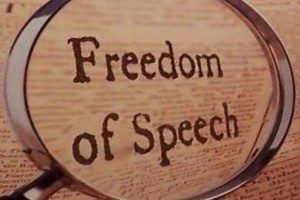Originally Published in The Washington Post
 While many celebrated the winter holidays, news broke of the arrest in Saudi Arabia of liberal writer Turki Al Hamad for allegedly insulting Islam on Twitter. We also heard of another Saudi activist, Raif Badawi, who was arrested in June and will now continue with his trial, accused of apostasy for ridiculing Saudi Arabia’s religious police and making other comments that officials found insulting. These incidents have re-ignited the age old debate about the use of freedom of speech, especially with regards to Islam.
While many celebrated the winter holidays, news broke of the arrest in Saudi Arabia of liberal writer Turki Al Hamad for allegedly insulting Islam on Twitter. We also heard of another Saudi activist, Raif Badawi, who was arrested in June and will now continue with his trial, accused of apostasy for ridiculing Saudi Arabia’s religious police and making other comments that officials found insulting. These incidents have re-ignited the age old debate about the use of freedom of speech, especially with regards to Islam.
The difference between Islam’s view on free speech and the view promoted by free speech advocates these days is the intention and ultimate goal each seeks to promote. Whereas many secularists champion individual privileges, Islam promotes the principle of uniting mankind and cultivating love and understanding among people. Both endorse freedom for people to express themselves, but Islam promotes unity, whereas modern-day free speech advocates promote individualism.
Let me explain.
The ultimate goal of Islam is to unite mankind under a single banner of peace. The Koran– Islam’s holy scripture – says God created everyone in unity, but our own man-made differences has compromised our unity (2:214). In order to unite mankind, Islam instructs to only use speech to be truthful, do good to others, and be fair and respectful. It attempts to pre-empt frictions by prescribing rules of conduct which guarantee for all people not only freedom of speech but also fairness, absolute justice, and the right of disagreement.
The Koran instructs people to speak the truth (33:71), to speak in a manner that is best (17:54), to speak to others kindly (2:84) and to refrain from inappropriate speech (4:149). With Islam’s guidance to purify our intentions, it promotes free speech when our intention is to serve a good purpose, promote peace, bring people closer to God and unite mankind. If, however, our intentions are to insult others or promote disorder or division, we should refrain.
The most vocal proponents of freedom of speech, however, call us towards a different path, where people can say anything and everything on their mind. With no restraint on speech at all, every form of provocation would exist, thereby cultivating confrontation and antagonism. They insist this freedom entitles them the legal privilege to insult others. This is neither democracy nor freedom of speech. It fosters animosity, resentment and disorder.
Rather than focusing on privileges, Islam focuses on the principle to avoid speech that causes separation and conflict. Our words should have a positive impact on people’s lives, promote truth and promote justice. We agree with former U.S. President Dwight Eisenhower, who once said: “A people that values its privileges above its principles soon loses both.” Treating speech as supreme at the expense of world peace and harmony is an incredibly flawed concept. No matter how important the cause of free speech, it still pales in comparison to the cause of world peace and unity.
Opponents of Islam claim it denies freedom of speech and censors those who insult Islam. This is factually incorrect. Islam does not prescribe any worldly punishment for unseemly speech. So people who insult should not be persecuted. Islam grants everyone the right to express disagreements with others. After all, the Prophet Muhammad called differences of opinion a blessing in society and never sought to censor or threaten those who verbally attacked him.
According to the Koran, disbelievers called him “a mad man,” “a victim of deception,” a “fabricator” and treated him as a liar. Some claimed he was taught by another person instead of receiving revelations from God. They called the Koran “confused dreams” and “mere stories of the past” and even tore it into pieces.
Through this all, he courageously endured all verbal assaults. Rather than calling for any punishment, the Koran instructs us to “overlook their annoying talk” and “bear patiently what they say.” The lesson here for all Muslims is that we are not to be afraid of insults. Rather, we must have the same courage as our Prophet to face such insults in the eye and respond with forbearance and calm, righteous speech. Muslims must learn how their faith instructs them to respond when they are verbally attacked. No riots; no violence. We respond to speech with speech, but our speech is to be better and more dignified.
So while antagonists and enemies of peace create slanderous videos, cartoons or advertisements – like the “Innocence of Muslims” film, Pamela Geller’s new ignorant NYC subway ads and Charlie Hebdo’s cartoon about Prophet Muhammad – let us not fall for their claim that an individual’s privilege to say whatever they want is more important than the higher principle of uniting people and saving this planet from a path of animosity, hatred and destruction. Rather than falsely accusing Islam of censorship, let us understand the beauty of giving higher consideration to mankind over our own personal privileges. And let us listen to the wisdom of the Khalifa of Islam, His Holiness Mirza Masroor Ahmad, who said: “Let it not be that in the name of freedom of speech the peace of the entire world be destroyed.”
Harris Zafar is National Spokesperson for Ahmadiyya Muslim Community USA – among the eldest Muslim organizations in America – and a frequently lecturer about Islam throughout the country. He can be contacted by email (harris.zafar@ahmadiyya.us) and followed on Twitter (@Harris_Zafar).
